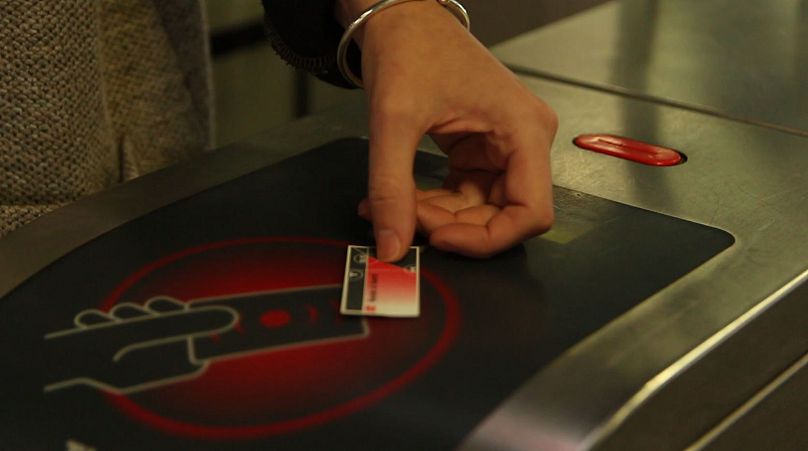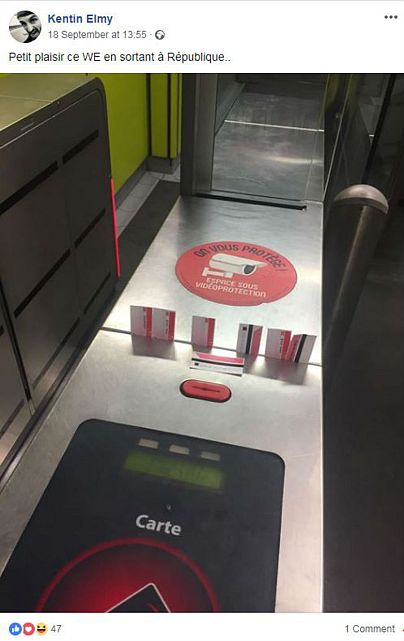'Solidarity is not a crime,' argued protesters in Lyon who said the city's public transport network is imposing a €150 fine on people who give their tickets to other passengers
Ever given your car park ticket to another driver if there's time left on it? This is a similar gesture to that carried out by many commuters in Lyon every day when they give their metro ticket to another passenger or leave it behind for someone else to pick up.
For many in the eastern French city, leaving their transport ticket on metro barriers when they exit the station has become a reflex — a generous act that doesn't cost anything but could help someone in need, or simply brighten the day of a fellow transport user.
One ticket can be used across most of Lyon's public transport network, including buses, trams, trolleybuses, the metro and funicular lines.
Costing between €1.80 and €2.20 depending on where it is bought, the ticket is valid for one hour, so the holder can make as many journeys as they like within this time.
'Solidarity is not a crime'
In autumn 2017, Lyon's public transport organisation Transports en Commun Lyonnais (TCL) launched a campaign across its network aimed at tackling fraud.
One flyer read: "Giving up your ticket is not an act of solidarity or generosity, it helps to support fraud. It is called the complicity to fraud and it comes at a price."
Along with the stark warning came new information concerning fines on the network — €60 for travelling without a valid ticket, €150 for any other offence. Giving away your ticket would, technically, fall under the latter.
There was a public outcry on social media and SYTRAL, the transport organising authority for Lyon and the wider Rhône department, has since tried to explain the ill-advised campaign.
While she was not yet President of SYTRAL when the campaign was validated, Fouzya Bouzerda told local paper Lyon Capital that "the advert was clumsy".
"What we're communicating is less the offence of solidarity, more what is happening in the stations concerning criminal networks, the ticket is a tool to fight against them directly," she added.
One year on, protesters are still unhappy, taking to one of Lyon's main squares, Place Bellecour, to show their opposition to the policy in a demonstration at the end of September 2018.
'It makes me very indignant'
"I'm at the event today because I find it abhorrent to condemn people for that (giving their used ticket to someone else), it doesn't hurt anyone," one protester told Euronews, "it makes me very indignant."
Another added: "The accusation of 'complicity to fraud' for this action, these are really strong words, it's totally wacky."
The protest, which was named "Solidarity is not a crime", was organised by MAN Lyon (Movement for a Non-violent Alternative Lyon), and demonstrators were encouraged to leave their hourly ticket on metro barriers and take a photograph to share on social media.
"We've sent a message to the director of SYTRAL telling her what we're doing and asking for a meeting but we haven't had a response," Alice, a volunteer for MAN Lyon told Euronews at the protest.
A fine fixed by governmental decree
This measure was put in place to stop the resale of tickets at an elevated price to tourists or vulnerable individuals, Pascale Jacquesson, Director General of Keolis Lyon, TCL's operator, explained to Euronews.
It is undeniable that this practice happens in Lyon's metro system. While out filming, we saw one such person reselling tickets in Bellecour metro, but when we approached the man, he quoted us a price of €1 for a used ticket — nearly half the price of a new one.
"The fact that a ticket is personal is not at all a feature of Lyon alone," Jacquesson continued. "There is nothing particularly new about this rule that has been in place for a very long time."
As for the amount of the fine, he confirmed this had been raised but said the upper limit was defined by a governmental decree in May 2016 and is uniform across France.
In fact, the decree itself does not specifically mention the violation of giving away or reselling one's ticket, only the offence of travelling without a valid ticket.
TCL outlines the network's rules on its website, where it says passengers cannot give away or resell their ticket and it is considered a "fourth class offence".
Elsewhere on its site in a shorter list of offences, TCL says a €150 fine is imposed for fourth class offences that include spitting, urinating, damaging or defiling spaces and leaving objects unattended.
"There can be cases of €150 fines that are laid down by the law but these are cases that go further than the simple absence of a ticket," said Jacquesson, "but we give very few fines at €150."
He added that tickets for those in financial difficulty were available on the TCL network, including one monthly subscription at €9.10 and that controllers would always favour pedagogy for over a fine for those in facing hardship.
I will continue to give my ticket away
Despite the threat of a €150 fine, a walk around Lyon's transport system showed piles of tickets left at metro exits and at bus stops.
Protesters at the demonstration were adamant they would continue with this time-honoured Lyonnais tradition.
"I'm one of the people who always gives away their metro ticket and I put it straight into the hand of someone, so it's not wasted and it helps someone that might need it," one protester told Euronews.
"We're here (at the protest) to try and advance a resolution to this issue and, of course, we'll continue to give our tickets to others," said another.













